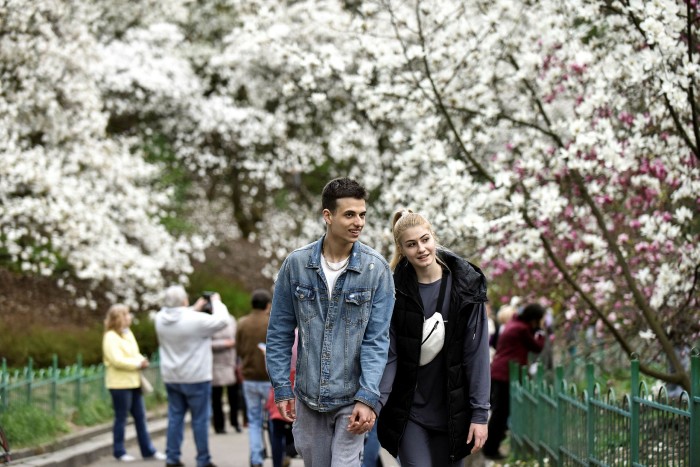Mykhailo Sydorenko was delighted to be heading home. The 26-year-old IT worker from Kyiv spent the first nine weeks of Russia’s invasion of Ukraine safely in Berlin and he could not wait to return.
“All our friends are back in town,” he said as he waited in line at the Krakovets crossing on the Poland-Ukraine border. As a military-age male, Sydorenko will not be permitted to leave the country again, but he was undeterred.
“I’ve never felt myself as Ukrainian as I do now,” he said. “It is like some inner fire that drives you. I’ve seen the world and nothing is better than Kyiv right now.”
A few cars up the queue, Anna was nearing the end of a marathon journey that had taken her and her two children as far as Portugal, more than 3,000km away, after fleeing the fighting on March 1.
“We want to come home,” she said. “It is difficult to be abroad when there is a war in your native country. We felt we had to come back. We don’t know for how long. We may have to leave again.”
Ukrainians have returned in droves since Russia withdrew its forces from around the capital at the end of March and refocused its offensive on the eastern Donbas region and parts of the south.
Of the 5mn Ukrainians who fled Ukraine after Moscow launched its full-scale invasion on February 24, more than 1mn have returned, according to Denys Shmyhal, Ukraine’s prime minister.

The refugee crisis is far from over. While many Ukrainians return from exile in the west of the country or from across the border in the EU, millions more are fleeing fighting in the Donbas.
Still, many of Kyiv’s residents have deemed the capital safe enough to live in once again, even though the mayor, Vitali Klitschko, has urged them to stay away for a while longer, warning of the continuing risks of war and of limited public services. A chronic shortage of fuel, after Russian forces destroyed one of Ukraine’s main oil refineries, may also complicate return journeys.
In a reminder of the constant danger, two Russian missiles slammed into a northern neighbourhood of Kyiv on Thursday night, setting fire to an apartment block. It was the first missile attack on the capital for two weeks.
In the city’s downtown Podil district, hundreds of people enjoying spring weather strolled streets that were deserted only a few weeks earlier when Kyiv was under threat of capture. Cafés, restaurants and barber shops have reopened but many other retailers and offices have not and traffic is light, creating a Sunday-style atmosphere.
“This feels like a weekend . . . I don’t feel like it’s a working day,” said Bohdan Makeyenko, nibbling a hot dog with his girlfriend. They recently returned to Kyiv from western Ukraine.
“I can work remotely, I didn’t lose my job in logistics,” the 24-year-old said. His partner, Maria Yakovenko, was not so lucky.
“I worked in manicure but there is no demand for this now and I basically don’t have any money now,” she said, adding that the rest of her family remained in the west.
Around the corner, Vyacheslav, manager of the Naprosecco oyster bar, was giving instructions to an employee on how to adjust lighting on the venue’s exterior to attract more customers.
“We decided to reopen a week ago when 50 per cent of our 40 or so employees returned . . . the rest are waiting as the mayor of Kyiv says it could still be dangerous,” said Vyacheslav.
“But business is going OK, as many people are returning to Kyiv,” he added.
Brian Best, managing director of Kyiv-based investment bank Dragon Capital, said most of his employees who left for the western city of Lviv in February had yet to come back. Many, he said, were waiting for May 9 — which, as Victory Day marking the Soviet Union’s defeat of Nazi Germany, holds special significance for Russia. They wanted to see whether President Vladimir Putin might escalate his offensive at that point or declare victory and scale it back.
“For some reason, May 9 is a magical day. I don’t buy into that, but if colleagues draw comfort from that, that’s fine,” Best added.
Dragon Capital, a big real estate investor, owns 11 warehouses across Ukraine. Three of them around Kyiv were destroyed by Russian bombs in the early phase of the invasion. There was still some trepidation that Russian forces could attack the capital again.
“People are still not 100 per cent sure that Kyiv and toppling the regime here is off the list,” Best said.
Andy Hunder, president of the American Chamber of Commerce in Ukraine, said from his temporary home in London that many top managers of member companies were making plans to return to Kyiv in coming weeks. However, uncertainty about whether schools would reopen meant others, especially female executives, were staying put abroad. Expat managers were waiting for the US embassy to reopen in the capital, he added. For the moment it is running only limited services in Lviv.
“With air raid sirens continuing to blare across the country, companies are reluctant to open due to safety risks of customers and personnel, having to pull down the shutters every time the bombing alarm goes off,” Hunder added.
As he waited at the Polish border, Sydorenko was sanguine about the dangers of returning to Ukraine’s capital.
“Now it is sort of predictable,” he said. “There [are] still some chances of air strikes in Kyiv. But we are ready to take that chance.”

